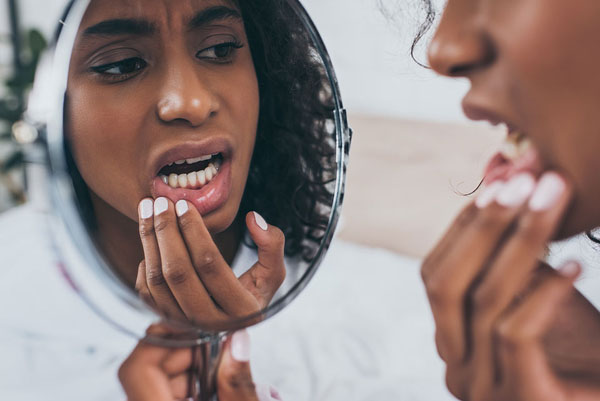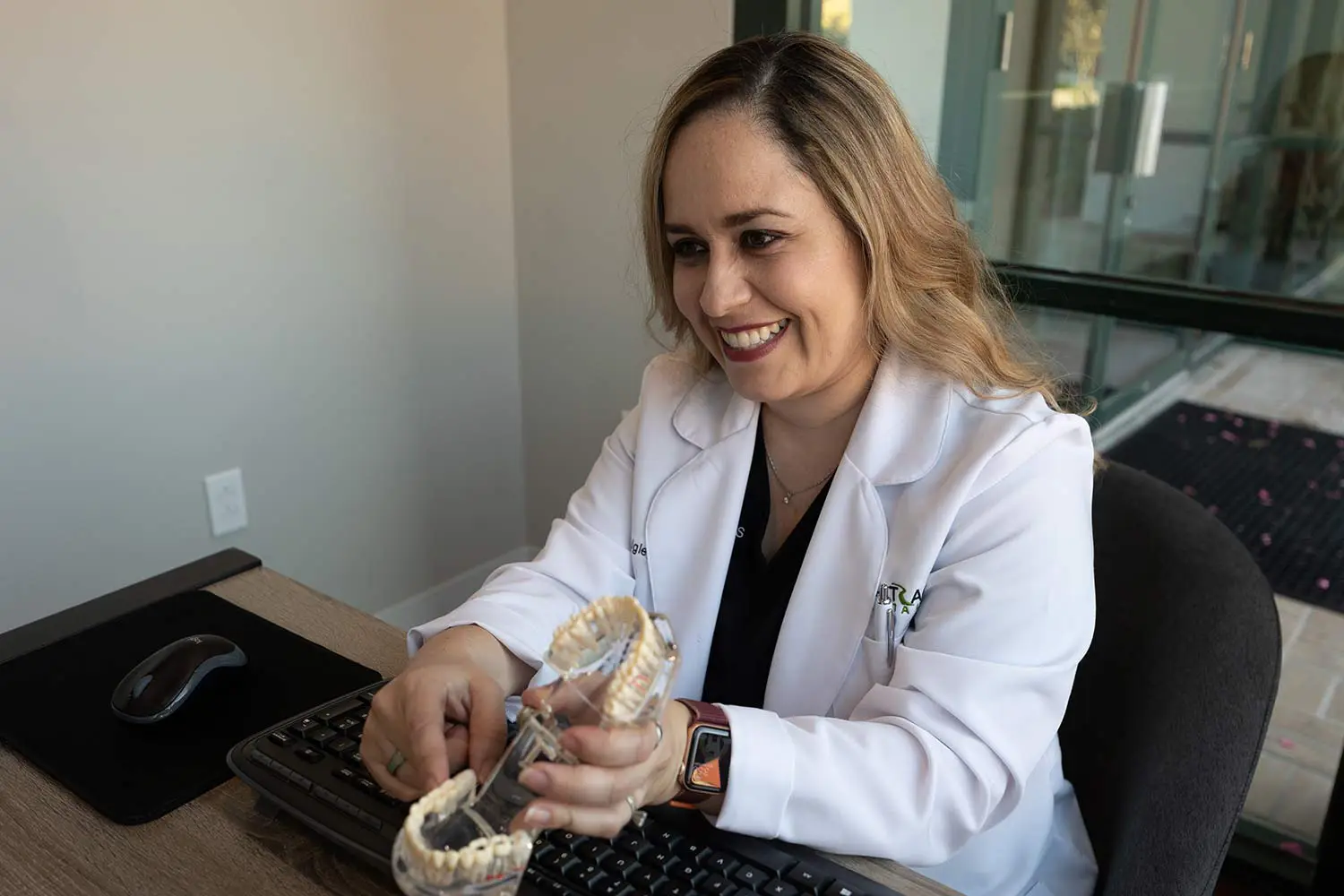Our Slidell, LA, Dentist Breaks Down Risks and Complications of Dentures
While dentures in Slidell can be an effective way to restore a person’s ability to eat, speak, and smile, they also come with potential complications. Gum irritation, mouth infections, difficulty speaking, and discomfort are some of the most common risks associated with dentures. Understanding these risks and how to prevent them can help individuals make informed decisions about their dental care and maintain good oral health.
Contact our Slidell dentist today by calling (985) 214-2844 to schedule an appointment if you need new dentures or if you want to learn more about how we can help you achieve optimal oral health with dentures. We also proudly serve patients coming from Eden Isle, Pearl River, and Lacombe.

Expertise and Compassion Combined With Dr. Pamela Daigle
Dr. Pamela Daigle is not just a skilled dentist; she’s someone who truly cares about her patients’ well-being. With a Doctor of Dental Surgery degree from Universidad de San Martín de Porres School of Dentistry in Peru and Louisiana State University School of Dentistry, Dr. Daigle brings a wealth of knowledge and hands-on experience to every procedure, including dentures. Her ability to speak Spanish, English, and Portuguese ensures she can communicate clearly and effectively with a diverse range of patients.
Whether you’re seeking full dentures, partials, or a more specialized solution, our dentist in Slidell commitment to personalized care means your comfort, confidence, and long-term satisfaction are her top priorities.

Denture Risks and Complications in Slidell
Gum Irritation
Wearing dentures can cause gum irritation, especially if they don’t fit properly or aren’t properly cleaned. Poor-fitting dentures may rub against the gums, leading to soreness, redness, and inflammation. This irritation can make it difficult to wear the dentures comfortably. Regular adjustments from your dentist can help ensure a proper fit and prevent discomfort.
Mouth Infections
If dentures are not properly cleaned, they can become a breeding ground for bacteria and fungi, leading to mouth infections like oral thrush or other bacterial infections. Failing to follow a consistent cleaning routine can also cause bad breath (halitosis), which can be embarrassing and socially isolating. Regular cleaning of your dentures and your gums can help prevent these issues.
Dry Mouth
Dry mouth is a common problem for denture wearers because dentures can rub against the gums and irritate the salivary glands. This can lead to discomfort and make it difficult to keep the dentures clean. A dry mouth also increases the risk of tooth decay, gum disease, and other oral health issues. If you’re experiencing dry mouth, speak to your dentist about possible solutions, such as saliva substitutes or denture adjustments.
Difficulty Speaking and Eating
Dentures can feel bulky and uncomfortable at first, which can make it difficult to eat and speak properly. For some people, it takes time to adjust to speaking with dentures, and some may never fully adapt. Initially, you may have trouble pronouncing certain words or experience difficulty chewing certain foods. With practice and proper adjustments, speaking and eating should become easier.
Changes in Taste
Dentures can cover the taste buds on the roof of the mouth, altering the ability to taste food properly. Some denture wearers may also experience a metallic taste due to the materials used in making the dentures. Over time, these sensations typically subside, but it’s important to report any significant changes to your dentist.
Bad Breath
Bad breath (halitosis) can develop in denture wearers, especially if the dentures are not cleaned properly after meals. Bacteria can accumulate on the dentures, causing unpleasant odors. To avoid this, dentures should be cleaned regularly with a specialized denture cleaner, and the gums, tongue, and mouth should be brushed daily to maintain fresh breath.
Bone Loss
When teeth are missing, the jawbone can begin to shrink over time. This natural process, known as bone resorption, can cause dentures to become loose and ill-fitting. Loose dentures can lead to discomfort and difficulty eating and may require more frequent adjustments. Bone loss can also affect the appearance of the face, leading to a sunken or aged look. Bone grafting or implant-supported dentures may be options to help prevent bone loss.
Gum Disease
Dentures can trap food particles and bacteria, leading to gum disease if not properly cleaned. Gum disease, also known as periodontal disease, can cause inflammation, infection, and even tooth loss if left untreated. Denture wearers should brush their gums, tongue, and any remaining natural teeth daily, and clean their dentures thoroughly after every meal to prevent gum disease.
Denture Stomatitis
Denture stomatitis is a common fungal infection caused by a buildup of bacteria and yeast on the dentures. It results in redness, soreness, and white patches on the gums. This condition is often a sign of poor denture hygiene or an ill-fitting denture that creates a moist, warm environment conducive to yeast growth. Regular cleaning and proper denture care can help prevent denture stomatitis.
Frequently Asked Questions
If you wear dentures constantly, you can increase the risk of several complications:
- Gum Irritation and Inflammation: Wearing dentures without giving your gums a break can cause pressure on the gums, leading to irritation, inflammation, and discomfort. In some cases, you may experience bleeding gums.
- Dry Mouth: Continuous wear can irritate the salivary glands, leading to a dry mouth. A dry mouth makes it harder to keep the dentures clean and increases the risk of tooth decay and gum disease.
- Infections: Dentures can harbor bacteria if not cleaned properly, leading to infections in the mouth, including gum disease, oral thrush, and even pneumonia in severe cases.
It’s important to remove your dentures at night and clean them thoroughly to allow your gums to rest and maintain good oral hygiene.
There are several ways to prevent complications with your dentures:
- Proper Cleaning: Brush and floss your dentures daily, using a specialized denture cleaner. Clean your gums, tongue, and any remaining natural teeth as well.
- Regular Dentist Visits: Visit your dentist regularly for checkups and denture adjustments to ensure they fit properly and remain in good condition.
- Quit Smoking: Smoking can increase the risk of gum disease and other oral health problems, including denture complications.
- Healthy Diet: Maintain a nutritious diet to support healthy gums and jawbones, which are essential for optimal denture fit.
- Be Aware of Fit: Pay attention to how your dentures feel in your mouth. If they become loose, uncomfortable, or cause pain, consult with your dentist for adjustments.
While dentures themselves don’t directly cause bone loss, wearing them without addressing bone resorption can contribute to further bone deterioration. When teeth are lost, the jawbone begins to shrink, which can affect the fit of your dentures over time. To prevent this, dental implants or bone grafting procedures may be recommended to stabilize the jawbone and maintain facial structure.
If your dentures feel loose or uncomfortable, it’s important to schedule an appointment with your dentist. Over time, the shape of your mouth can change, causing dentures to fit less securely. Your dentist may recommend adjustments, relining, or even replacement dentures to restore comfort and functionality.
Learn More About Dentures at Off the Trace Dental in Slidell Today!
While dentures provide many benefits, they also come with potential risks. By taking care of your dentures, cleaning them properly, and seeing our Slidell, LA, dentist regularly for checkups, you can minimize the risk of complications.
If you experience any problems with your dentures, such as gum irritation, mouth infections, or difficulty speaking, don’t hesitate to contact our Slidell dental office at (985) 214-2844 for advice and treatment. We also proudly serve patients coming from Eden Isle, Pearl River, and Lacombe.
